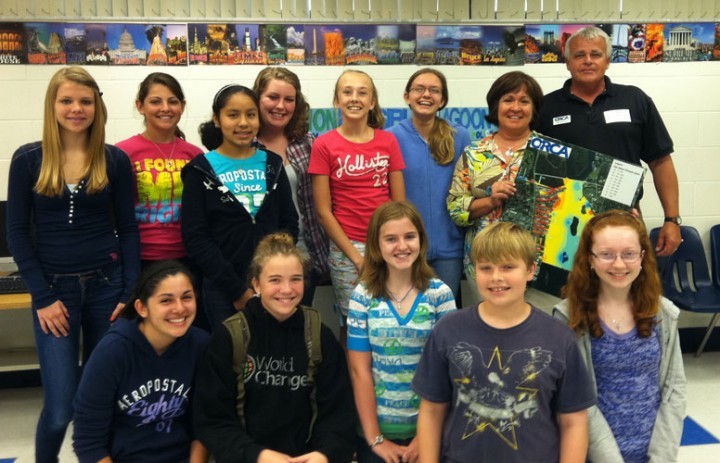INDIAN RIVER COUNTY — Two leading ecologists recently stopped by Sebastian River Middle School to educate and encourage students who have launched an effort to protect the Indian River Lagoon from fertilizer poisoning.
Warren Falls, managing director of the Ocean Research and Conservation Association, and ORCA research scientist Beth Falls gave a presentation about lagoon ecology and ORCA’s use of cutting edge technology to map pollution in the estuary. They also gave students tips on how to influence public policy to protect the natural environment.
“They were very receptive,” says Warren Falls. “We were there at their teacher Laurie Wykoff’s invitation to talk with them about their presentation and give them ideas how to make it better.”
Earlier this year, a group of Wykoff’s 7th grade civics students created a project called “Mission Possible: Lagoon Rescue” as part of a national student activism competition inspired by the Project Citizen program.
The program is administered by Civics First, a private nonprofit education association that “actively engages students in learning how to monitor and influence public policy and encourages civic participation among students, their parents, and members of the community.”
Their efforts are needed in Indian River County where the County Commission has so far declined to pass fertilizer regulations, despite a strong scientific consensus regulations are needed to protect the lagoon.
“I love going out in the lagoon,” says Katrina Nilsson, who lives across the street from the estuary. “I like seeing all the dolphins. I like swimming. I saw a sunfish one time – oh my gosh, they are these big, big fish that look like a fin. It was huge, thousands of pounds, and it was in the lagoon.”
Others in the group talk about their fascination with seahorses, game fish and manatees.
But they are also driven by the facts.
“The lagoon creates more than $800 million in annual economic benefits for Indian River County,” Nilsson says.
The Mission Possible team researched their topic, reading and conducting interviews, and created a multi-panel poster board explaining the problem of fertilizer runoff, identifying the pros and cons of various solutions and recommending government regulation.
On Feb. 27, the students presented their findings to a packed audience at the Indian River County School Board business meeting, and they will appear before the County Commission in May.
They also plan to create a website reporting their findings and circulate a petition gathering signatures in support of government regulation of a problem that affects everyone in the community.
“They are extremely bright, energetic, caring kids who are passionate about what they are doing,” says Warren Falls.
ORCA was founded in 2005 by renowned ocean scientist Edie Widder, Ph.D., a MacArthur Genius Award recipient, with a focus on developing innovative technologies to protect and restore aquatic ecosystems and the species they sustain.
Housed in the historic Coast Guard station in Fort Pierce, ORCA is critical center of ocean research and conservation efforts. Widder and the scientists and engineers working with her have developed revolutionary methods for measuring pollution in real time and have created the first pollution map covering part of the Indian River Lagoon.
A presentation Widder made before the Vero Beach City Council helped motivate the city to pass fertilizer regulation to protect the waterway that is the economic and aesthetic centerpiece of Indian River County.
“ORCA is trying to make a difference by providing accurate information based on scientific findings to stakeholders, governments and citizens in an effort to clean up our waters,” says Warren Falls.

